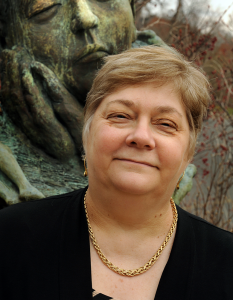
GUMC professor Elissa Newport will accept the Franklin Institute Award for her research in April.
Elissa Newport, professor of neurology and Director of the Georgetown University/MedStar National Rehabilitation Network Center for Brain Plasticity and Recovery, has been announced as one of the winners of the prestigious Franklin Institute Award for her research focusing on the acquisition of language, especially in children. Newport will be joined by the nine other winners at a special ceremony in Philadelphia on Apr. 23.
Other scientists to win the award have included Thomas Edison, Marie Curie, Nikola Tesla, Stephen Hawking, Jacques Cousteau, Jane Goodall and Bill Gates, and 113 Franklin Institute laureates have earned 115 Nobel Prizes.
“These are some of the greatest minds and most influential pioneers of our time who come to Philadelphia to receive this honor and inspire us all,” The Franklin Institute President and CEO Larry Dubinski said in a press release.
The Franklin Institute is one of the oldest centers for science education and development in the United States, and its award program dates back to 1824.
Newport will receive the Benjamin Franklin Medal in Computer and Cognitive Science for her work on human language, particularly focusing on developing children in typical and atypical environments and recovering language skills after brain damage.
Her “Less is More Hypothesis,” one of her more widely known contributions, posited that children have a higher capacity to learn languages because they have fewer cognitive resources available to them. Adults have more difficulty because they attempt to understand language using more complex analysis, and they cannot find broad patterns as easily.
Newport said she was ecstatic upon hearing the news.
“I was incredibly thrilled and surprised. It is a huge honor to have my work recognized by the Franklin Institute, [which] has already awarded some of the most distinguished scientists of all times,” Newport said.
Newport has been part of the Georgetown faculty since July of 2012. Newport is also a member of the National Academy of Arts and Sciences and a fellow in the American Academy of Arts & Sciences. In addition to studying the acquisition of language in children, Newport’s research attempts to apply these findings to adults and recovery after brain damage.
“My research focuses on developmental plasticity. The theory is that children at a developmental age find it easier to learn a language than adults because they have less cognitive resources available to them,” Newport said. “My second line of research focuses on language recovery after brain damage. The idea is to use our findings in our research with children in order to enhance recovery from strokes or brain damage in adults.”
Howard J. Federoff, executive vice president for health sciences at Georgetown University Medical Center and executive dean of its School of Medicine, praised Newport’s accomplishment and her research contributions to the university and the medical center.
“Dr. Newport is dedicated to understanding neuroplasticity — evident in her expansive research into human language acquisition for which she is being honored. We are fortunate to have her as Director of the Center for Brain Plasticity and Recovery, as she is now focused on neuroplasticity research that can impact the recovery from brain damage including stroke and traumatic brain injury,” Federoff said in a statement emailed to The Hoya.














